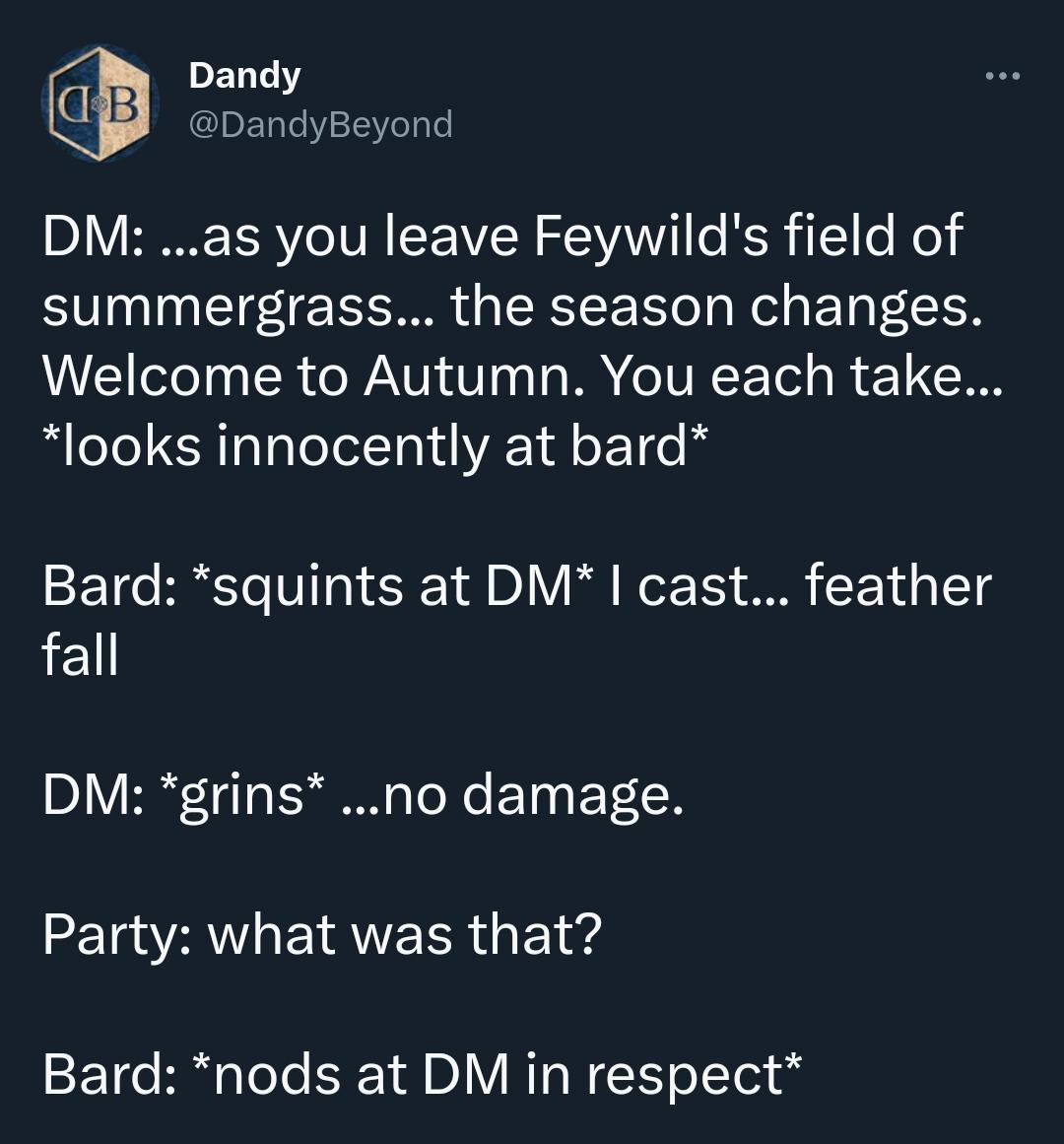this post was submitted on 11 Aug 2024
418 points (95.8% liked)
RPGMemes
10693 readers
468 users here now
Humor, jokes, memes about TTRPGs
founded 2 years ago
MODERATORS
you are viewing a single comment's thread
view the rest of the comments
view the rest of the comments

The English language still backs it up. If you fall, you are falling. Simply because there is an ing missing from the text of a thing not said in the joke doesn't mean that the joke doesn't work. On top of that there's the whole part of how the DM is God in a game, not the DMG or the rule book.
You didn't ruin anything. Just weirdly pedantic for no reason
Weirdly pedantic is fun sometimes, and I'd say especially so with D&D 5e rules that often are very poorly worded.
Damage taken from being the Fall season would be called "Fall damage" in English though. It is not a verb that you did, it is a noun that is. You are not falling. It is fall. Falling is only from a present tense verb of fall.
Sorry to be more pedantic.
If I’m in a fight, I’m fighting. If I’m on a walk, I’m walking. On a hike? Hiking. If I’m at a party, I’m partying. If there’s rain in the air, it’s raining. If I’m applying butter to my toast, I’m buttering my toast. If I’m on a boat, I’m boating. If I’m in the middle of a fall, I’m falling.
Is it hard to understand that someone is referring to the act of entering Fall (or being in the middle of Fall) when they call it “falling?”
Regardless of whether you find that difficult to understand or to accept, it’s a well-established linguistic phenomenon known as “verbification.”
You’re wrong on several counts.
First, you don’t suffer “falling damage” from falling. You suffer it from landing after falling (refer to page 183 of the PHB if you don’t believe me). However, casting Feather Fall is a reaction that you can take when you or another creature “falls,” so it was appropriate to cast it at the start of the season.
Second, “falling” is not the present tense of “fall.” The simple present tense of “fall” is “fall” or “falls,” but other “present tenses” include: the present perfect simple (“He has fallen”), present progressive/continuous, and present perfect progressive.
“Falling” is the present participle, and it can be used both as an adjective (“The falling bard”) and as part of the past continuous/progress (“The bard was falling”), present continuous/progressive (“The bard is falling”), and future continuous/progressive (“The bard will be falling”) verb tenses, as well as with their perfect variants (had been falling, has been falling, will have been falling).
Everything before fall was a verb. If you're in a pool, you aren't pooling. If you're in a car you aren't caring. If you're in spring you aren't springing. (We do have words for summering and wintering, but they're actions you take, not just being in the season.)
I get the joke. I was trying to make another joke by being pedantic, but now you're doing this. That is not how the English language works. You do not say your doing an action when you enter a season. You are entering Fall, but you aren't Falling. You are not doing something.
The damage is caused by the speed built up during the fall. Regardless, that's the word we use in English for it usually, but it could be called landing damage. Anyway, falling damage is calculated by the distance of the fall, so this Fall has no distance so if we decide to call it falling damage anyway and follow those rules it's zero damage.
Correct. I have no issue in how the action was taken, unless he was supposed to be unaware of it.
This is correct. Is this countering something I said or agreeing?
OK, this was too long of a reply for a stupid joke to a stupid joke...
Since we have all decided to be pedantic, 'falling' is not the past tense of 'fall'.
Its like a participle or gerund or some shit that means it is happening now. edit either I misread or original message was edited. Regardless others have thoroughly beaten me at being pedantic.
It should tell you if it's edited with an asterisk and it should say when the edit happened. I didn't edit the message though. It always said it was present tense.